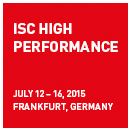 The stage is set for an unprecedented architectural melee at the upcoming ISC 2015 Student Cluster Competition in Frankfurt. For the first time, a student team will be bringing an ARM-based cluster to what has previously been an all-x86 competition.
The stage is set for an unprecedented architectural melee at the upcoming ISC 2015 Student Cluster Competition in Frankfurt. For the first time, a student team will be bringing an ARM-based cluster to what has previously been an all-x86 competition.
(For the rare individual who doesn’t know about student cluster competitions and why they’ve taken the computer world by storm, here’s some background info.)
We’re also going to see if the powerhouse South African CHPC team can complete the hat-trick and take home their third consecutive Overall Championship trophy. It’s a long shot to be sure, but not totally unprecedented.
I recorded a video with Brian Sparks looking at the upcoming competition and competitors. Brian is the HPC Advisory Council Events Director and one of the main movers and shakers behind the ISC competition.
The fourth annual ISC Cluster Competition will feature eleven teams of undergraduates, representing universities from around the world. Each team has had to secure sponsorships, design their cluster, learn how to tune it, and how to optimise their system for a variety of real-world HPC applications and benchmarks. The only constraint on their system is a constantly monitored 3,000 watt power cap. It’s quite a lot of work, and all of it in addition to their regular college activities (taking selfies, making up new slang, and being offended by things).
First look at the field
The field this year skews a bit towards the veteran side, with eight teams having varying levels of experience joined by three completely new teams. Let’s look at those teams in a bit more detail:
CHPC (Center for High Performance Computing), South Africa: This is the official moniker for the dominating and inspirational Team South Africa, two-time winner of the ISC Overall Championship. As is their tradition, South Africa turns over their entire team each year, meaning that each student is experiencing the big international ISC competition for the first time. This policy arises from the CHPC’s desire to spread HPC training throughout the country as quickly as possible. Students for each CHPC team are selected via an intra-country competition that takes place every December. In the video, Brian and I discuss how South Africa went from student cluster newbies to dominate power in just a few short years.
Purdue University & EAFIT, United States/Colombia: This is a team comprised of students from both universities. Purdue, with nine previous competitions under its belt, has partnered with new cluster competitor EAFIT from Colombia. ISC 2015 this year will mark their second collaborative effort, their first outing was at ISC 2014 last November. The blended team performed well at the SC competition, the hardware worked well, no last minute problems, and a finish in the top-middle of the pack. As the team continues to jell, I expect to see better results over time.
TU Chemnitz, Germany: It will be taking its third shot at cluster glory as ISC 2015 in Frankfurt. There’s a lot to like about this team. Who can forget its premier machine, the massively overpowered “Coffee Table of Doom”, which competed with 24 full-size accelerators. Last year, it nailed down a respectable fourth place overall finish, but also took home a well-deserved Fan Favorite Award. One new wrinkle this year is a new set of sponsors. Team Chemnitz is backed by cluster competition newcomer Lenovo, aided on the cooling side by CoolIT.
University of Science & Technology, China: Team USTC has quickly and quietly turned into an elite international clustering team. This is a team on the rise; finishing third overall at ISC 2014 and grabbing a close second place at ISC 2014, with an almost entirely different team lineup. Working closely with sponsor Sugon, Team USTC is looking to get over the hump and take home the grand champion prize at ISC 2015. Competition insiders consider it an early favorite to win and a shoe-in to take one of the top three spots. Definitely a team to be reckoned with.
University of Sao Paulo, Brazil: It’s great to see Team Brazil back for its third major cluster competition. While the plucky Brazilians have yet to finish in the money, they’ve become stronger with each tourney. Its effort at ISC 2014 was fraught with hardware, software, and application challenges, however the team did score in the top echelon when it came to the interview section of the competition, which means that it had a solid knowledge of what it was doing and why. Hopefully the team has put its bad luck behind it and will strongly compete at ISC 2015.
University of Hamburg, Germany: For a brand new team last year, Team Hamburg put on quite a show. Most new teams take a year or two to get used to the stress of the competitions and work out the best way to tackle competition tasks. While there was plenty of that for Team Hamburg, along the way it managed to post the highest score on the HPCG benchmark and post a second place score on the HPCC benchmark. If I were a vendor, I’d look to these kids for summer internships in my competitive and benchmarking department. It’ll be interesting to see how Team Hamburg performs in its second competition and if it can build on its success with the benchmark applications.
Tsinghua University, China: This will be the sixth major international competition for Team Tsinghua. Over the years, it’s amassed quite a record with a win at the inaugural ISC 2012 competition, and a razor-thin second place finish at ISC 2013. Team Tsinghua scored well in the ISC 2014 competition but was hampered by a lack of accelerators. The team earned its way into the ISC 2015 competition by placing first or second in Inspur’s regional Asian Student Cluster competition held a few months ago.
National University of Defense Technology (NUDT), China: Like Team Tsinghua, Team NUDT got its ticket punched by placing at the top of the Inspur Asian Student Cluster competition. NUDT is also a veteran team, with five previous competitions under its belts. At one time, the team was regarded as primarily “LINPACK jockies” due to its 2012-13 dominance in that category, but these days the team is a solid all-around performer.
Jamia Millia Islamia University, India: This is a newcomer to the big time clustering game. The university, presently located near Delhi, was founded in 1920 during India’s push for independence. The school of Engineering & Technology is even younger, booting up in 1985. India is the largest country to have never sent a team to a Student Cluster Competition and it’s great that this oversight is finally being corrected. Good luck Team India.
University of Tartu, Estonia: It’s located in the city of Tartu, Estonia. It’s an old school, a really old school. Its first class matriculated in 1632, graduating with degrees in Law, Philosophy, Theology, and Communications. (Ok, maybe not Communications.) The university was founded by Swedish King Gustavus Alolphus back when Tartu was located within Sweden. These days, the university has a full slate of sciences, including lots of things associated with lasers and theoretical computer science (and lasers). I’m looking forward to meeting with Team Tartu and seeing what it’s bringing to the table for ISC 2015. Welcome to the competition, Estonia.
Universidad Politecnica de Catalunya (UPC), Spain: Last but not least is Team Spain. This is a team that’s going to garner a lot of attention in Frankfurt, and not only for its amazing Flamenco dance demonstrations (hourly on the half hour and it’s stunning). One of the team sponsors is the Barcelona Supercomputer Center, the same Barcelona Supercomputer Center that’s spent years exploring an ARM+GPU supercomputer. So Team Spain will be sporting an ARM-based cluster with plenty of beefy GPUs for the heavy lifting. It’ll be interesting to see how this machine performs on standard HPC workloads.
Speaking of workloads, our next entry will discuss the workloads that the students will be asked to run next week in Frankfurt. Then it’s off to Germany to immerse ourselves in wall-to-wall coverage of the cluster competition and all things HPC. Stay tuned.
Posted In: Latest News, ISC 2015 Frankfurt
Tagged: supercomputing, Student Cluster Competition, HPC, ISC 2015
